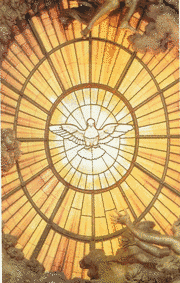
Novena to the Holy Spirit
With quotes from Pope St John Paul II's encyclical on the Holy Spirit, Dominum et Vivificantem, which JPII gave to us on the Solemnity of Pentecost 1986. The original novena was the 9 days of prayer by Mary and the disciples in the Upper Room, after the Ascension of Jesus into heaven before the descent of the Holy Spirit at Pentecost.
The daily prayers of this novena are:
Come, O Holy Spirit, fill the hearts of the faithful, and enkindle in them the fire of your love. Send forth your Spirit and they shall be created, and you will renew the face of the earth. O God, Who instructs the hearts of the faithful by the light of the Holy Spirit, grant us in the same Spirit to be truly wise, and ever to rejoice in His consolation. Through Christ our Lord. Amen. (traditional prayer to the Holy Spirit)
Renew, Your wonders in this our day, as by a new Pentecost. Grant to Your Church that, being of one mind and steadfast in prayer with Mary, the Mother of Jesus, and following the lead of blessed Peter, it may advance the reign of our Divine Saviour, the reign of truth and justice, the reign of love and peace. Amen. (by St John XXIII)
Come, Holy Spirit, come and renew the face of the earth! Come with your seven gifts, Spirit of Life; Come, Spirit of Communion and Love! The Church and the world need you. Come, Holy Spirit, and make ever more fruitful the charisms you have bestowed on us. Amen. (by St John Paul II)
Remember, O most gracious Virgin Mary, that never was it known that anyone who fled to thy protection, implored thy help, or sought thine intercession was left unaided. Inspired by this confidence, I fly unto thee, O Virgin of virgins, my mother; to thee do I come, before thee I stand, sinful and sorrowful. O Mother of the Word Incarnate, despise not my petitions, but in thy mercy hear and answer me. Amen. (The Memorarae)
The music (Veni Sancte Spiritus) is sung by the Poor Clare Sisters in enclosed community at Ty Mam Duw (North Wales). You can pray this novena at any time but it was recorded especially for a Pentecost novena in 2010, for which 9 of the Sisters also gave reflections (included below) on Mary and the Holy Spirit. You can subscribe to this Totus2us Novenas podcast on Spotify, here on itunes or here on RSS feed. To download the free mp3 audio recordings individually, right/double click on the play buttons.
Day 1 of Totus2us' Novena to the Holy Spirit 
1. The Church professes her faith in the Holy Spirit as "the Lord, the giver of life." .. These are words which the Church receives from the very source of her faith, Jesus Christ. In fact, according to the Gospel of John, the Holy Spirit is given to us with the new life, as Jesus foretells and promises on the great day of the Feast of Tabernacles: "If any one thirst let him come to me and drink. He who believeth in me as the scripture has said, 'Out of his heart shall flow rivers of living water.'" And the Evangelist explains: "This he said about the Spirit, which those who believed in him were to receive." It is the same simile of water which Jesus uses in his conversation with the Samaritan woman, when he speaks of "a spring of water welling up to eternal life," and in his conversation with Nicodemus when he speaks of the need for a new birth "of water and the Holy Spirit" in order to "enter the kingdom of God."
The Church, therefore, instructed by the words of Christ, and drawing on the experience of Pentecost and her own apostolic history, has proclaimed since the earliest centuries her faith in the Holy Spirit, as the giver of life, the one in whom the inscrutable Triune God communicates himself to human beings, constituting in them the source of eternal life
2. This faith, uninterruptedly professed by the Church, needs to be constantly reawakened and deepened in the consciousness of the People of God. .. In our own age, then, we are called anew by the ever ancient and ever new faith of the Church, to draw near to the Holy Spirit as the giver of life. .. [At] the First Council of Constantinople .. the Holy Spirit was then better seen, through a meditation on the mystery of the Church, as the one who points out the ways leading to the union of Christians, indeed as the supreme source of this unity, which comes from God himself and to which St Paul gave a particular expression in the words which are frequently used to begin the Eucharistic liturgy: "The grace of our Lord Jesus Christ and the love of God and the fellowship of the Holy Spirit be with you all."
.. From this exhortation now comes the present Encyclical on the Holy Spirit, who proceeds from the Father and the Son; with the Father and the Son he is adored and glorified: a divine Person, he is at the center of the Christian faith and is the source and dynamic power of the Church's renewal.. the Church is also responding to certain deep desires which she believes she can discern in people's hearts today: a fresh discovery of God in his transcendent reality as the infinite Spirit, just as Jesus presents him to the Samaritan woman; the need to adore him "in spirit and truth"; the hope of finding in him the secret of love and the power of a "new creation": yes, precisely the giver of life.
The Church feels herself called to this mission of proclaiming the Spirit… Against the background of a heaven and earth which will "pass away," she knows well that "the words which will not pass away" acquire a particular eloquence. They are the words of Christ about the Holy Spirit, the inexhaustible source of the "water welling up to eternal life," as truth and saving grace. Upon these words she wishes to reflect, to these words she wishes to call the attention of believers and of all people, … Their main purpose is to develop in the Church the awareness that "she is compelled by the Holy Spirit to do her part towards the full realization of the will of God, who has established Christ as the source of salvation for the whole world."
Something about Mary and the Holy Spirit ![]()
by Mother Francesca PCC
Day 2 of Totus2us' Novena to the Holy Spirit 
7. Between the Holy Spirit and Christ there subsists, in the economy of salvation, an intimate bond, whereby the Spirit works in human history as "another Counselor," permanently ensuring the transmission and spreading of the Good News revealed by Jesus of Nazareth. Thus, in the Holy Spirit-Paraclete, who in the mystery and action of the Church unceasingly continues the historical presence on earth of the Redeemer and his saving work, the glory of Christ shines forth, as the following words of John attest: "He [the Spirit of truth] will glorify me, for he will take what is mine and declare it to you." By these words all the preceding statements are once again confirmed: "He will teach..., will bring to your remembrance..., will bear witness." The supreme and complete self-revelation of God, accomplished in Christ and witnessed to by the preaching of the Apostles, continues to be manifested in the Church through the mission of the invisible Counselor, the Spirit of truth. How intimately this mission is linked with the mission of Christ, how fully it draws from this mission of Christ, consolidating and developing in history its salvific results, is expressed by the verb "take": "He will take what is mine and declare it to you." As if to explain the words "he will take" by clearly expressing the divine and Trinitarian unity of the source, Jesus adds: "All that the Father has is mine; therefore I said that he will take what is mine and declare it to you." By the very fact of taking what is "mine," he will draw from "what is the Father's." ....
10. In his intimate life, God "is love", the essential love shared by the three divine Persons: personal love is the Holy Spirit as the Spirit of the Father and the Son. Therefore he "searches even the depths of God," as uncreated Love-Gift. It can be said that in the Holy Spirit the intimate life of the Triune God becomes totally gift, an exchange of mutual love between the divine Persons and that through the Holy Spirit God exists in the mode of gift. It is the Holy Spirit who is the personal expression of this self-giving, of this being-love. He is Person-Love. He is Person-Gift. Here we have an inexhaustible treasure of the reality and an inexpressible deepening of the concept of person in God, which only divine Revelation makes known to us.
At the same time, the Holy Spirit, being consubstantial with the Father and the Son in divinity, is love and uncreated gift from which derives as from its source (fons vivus) all giving of gifts vis-a-vis creatures (created gift): the gift of existence to all things through creation; the gift of grace to human beings through the whole economy of salvation. As the Apostle Paul writes: "God's love has been poured into our hearts through the Holy Spirit which has been given to us."
Something about Mary and the Holy Spirit ![]()
by Sister Agatha PCC
Day 3 of Totus2us' Novena to the Holy Spirit 
14. Therefore Jesus Christ says in the Upper Room "It is to your advantage I go away; ...if I go, I will send him to you." The "departure" of Christ through the Cross has the power of the Redemption and this also means a new presence of the Spirit of God in creation: the new beginning of God's self-communication to man in the Holy Spirit. "And that you are children is proven by the fact that God has sent into our hearts the Spirit of his Son who cries: Abba, Father!" As the Apostle Paul writes in the Letter to the Galatians. The Holy Spirit is the Spirit of the Father, as the words of the farewell discourse in the Upper Room bear witness. At the same time he is the Spirit of the Son: he is the Spirit of Jesus Christ, as the Apostles and particularly Paul of Tarsus will testify. With the sending of this Spirit "into our hearts," there begins the fulfillment of that for which "creation waits with eager longing," as we read in the Letter to the Romans.
The Holy Spirit comes at the price of Christ's "departure." While this "departure" caused the Apostles to be sorrowful, and this sorrow was to reach its culmination in the Passion and Death on Good Friday, "this sorrow will turn into joy." For Christ will add to this redemptive "departure" the glory of his Resurrection and Ascension to the Father. Thus the sorrow with its underlying joy is, for the Apostles in the context of their Master's "departure," an "advantageous" departure, for thanks to it another "Counselor" will come. At the price of the Cross which brings about the Redemption, in the power of the whole Paschal Mystery of Jesus Christ, the Holy Spirit comes in order to remain from the day of Pentecost onwards with the Apostles, to remain with the Church and in the Church, and through her in the world.
In this way there is definitively brought about that new beginning of the self-communication of the Triune God in the Holy Spirit through the work of Jesus Christ, the Redeemer of man and of the world.
Something about Mary and the Holy Spirit ![]()
by Mother Damien PCC
Day 4 of Totus2us' Novena to the Holy Spirit 
20. The theophany at the Jordan clarifies only in a fleeting way the mystery of Jesus of Nazareth, whose entire activity will be carried out in the active presence of the Holy Spirit. This mystery would be gradually revealed and confirmed by Jesus himself by means of everything that he "did and taught." In the course of this teaching and of the messianic signs which Jesus performed before he came to the farewell discourse in the Upper Room, we find events and words which constitute particularly important stages of this progressive revelation. Thus the evangelist Luke, who has already presented Jesus as "full of the Holy Spirit" and "led by the Spirit...in the wilderness," tells us that, after the return of the 72 disciples from the mission entrusted to them by the Master, while they were joyfully recounting the fruits of their labours, "in that same hour Jesus rejoiced in the Holy Spirit and said: 'I thank you, Father, Lord of heaven and earth, that you have hidden these things from the wise and the learned and revealed them to babes; yea, Father, for such was your gracious will.'" Jesus rejoices at the fatherhood of God: he rejoices because it has been given to him to reveal this fatherhood; he rejoices, finally, as at a particular outpouring of this divine fatherhood on the "little ones." And the evangelist describes all this as "rejoicing in the Holy Spirit."
This "rejoicing" in a certain sense prompts Jesus to say still more. We hear: "All things have been delivered to me by my Father; and no one knows who the Son is except the Father, or who the Father is except the Son and any one to whom the Son chooses to reveal him."
21. That which during the theophany at the Jordan came so to speak "from outside," from on high, here comes "from within," that is to say from the depths of who Jesus is. It is another revelation of the Father and the Son, united in the Holy Spirit. Jesus speaks only of the fatherhood of God and of his own sonship - he does not speak directly of the Spirit, who is Love and thereby the union of the Father and the Son. Nonetheless what he says of the Father and of himself - the Son - flows from that fullness of the Spirit which is in him, which fills his heart, pervades his own "I," inspires and enlivens his action from the depths. Hence that "rejoicing in the Holy Spirit." The union of Christ with the Holy Spirit, a union of which he is perfectly aware, is expressed in that "rejoicing," which in a certain way renders "perceptible" its hidden source. Thus there is a particular manifestation and rejoicing which is proper to the Son of Man, the Christ-Messiah, whose humanity belongs to the person of the Son of God, substantially one with the Holy Spirit in divinity.
In the magnificent confession of the fatherhood of God, Jesus of Nazareth also manifests himself, his divine "I" - for he is the Son "of the same substance," and therefore "no one knows who the Son is except the Father, or who the Father is except the Son," that Son who "for us and for our salvation" became man by the power of the Holy Spirit and was born of a virgin whose name was Mary.
Something about Mary and the Holy Spirit ![]()
by Sister Mary Elizabeth of the Trinity PCC
Day 5 of Totus2us' Novena to the Holy Spirit 
23. We find ourselves on the threshold of the Paschal events. The new, definitive revelation of the Holy Spirit as a Person who is the gift is accomplished at this precise moment. The Paschal events - the Passion, Death and Resurrection - of Christ - are also the time of the new coming of the Holy Spirit, as the Paraclete and the Spirit of truth. They are the time of the "new beginning" of the self-communication of the Triune God to humanity in the Holy Spirit through the work of Christ the Redeemer. This new beginning is the Redemption of the world: "God so loved the world that he gave his only Son." Already the "giving" of the Son, the gift of the Son, expresses the most profound essence of God who, as Love, is the inexhaustible source of the giving of gifts. The gift made by the Son completes the revelation and giving of the eternal love: the Holy Spirit, who in the inscrutable depths of the divinity is a Person-Gift, through the work of the Son, that is to say by means of the Paschal Mystery, is given to the Apostles and to the Church in a new way, and through them is given to humanity and the whole world.
24. The definitive expression of this mystery is had on the day of the Resurrection. On this day Jesus of Nazareth "descended from David according to the flesh," as the Apostle Paul writes, is "designated Son of God in power according to the Spirit of holiness by his Resurrection from the dead." It can be said therefore that the messianic "raising up" of Christ in the Holy Spirit reaches its zenith in the Resurrection, in which he reveals himself also as the Son of God, "full of power." And this power, the sources of which gush forth in the inscrutable Trinitarian communion, is manifested, first of all, in the fact that the Risen Christ does two things: on the one hand he fulfills God's promise already expressed through the Prophet's words: "A new heart I will give you, and a new spirit I will put within you,...my spirit"; and on the other hand he fulfills his own promise made to the Apostles with the words: "If I go, I will send him to you." It is he: the Spirit of truth, the Paraclete sent by the Risen Christ to transform us into his own risen image.
"On the evening of that day, the first day of the week, the doors being shut where the disciples were, for fear of the Jews, Jesus came and stood among them and said to them, 'Peace be with you.' When he had said this, he showed them his hands and his side. Then the disciples were glad when they saw the Lord. Jesus said to them again, 'Peace be with you. As the Father has sent me, even so I send you.' And when he had said this, he breathed on them, and said to them, 'Receive the Holy Spirit.'"
All the details of this key-text of John's Gospel have their own eloquence, especially if we read them in reference to the words spoken in the same Upper Room at the beginning of the Paschal event. And now these events - the Triduum Sacrum of Jesus whom the Father consecrated with the anointing and sent into the world - reach their fulfillment. Christ, who "gave up his spirit" on the Cross as the Son of Man and the Lamb of God, once risen goes to the Apostles 'to breathe on them" with that power spoken of in the Letter to the Romans. The Lord's coming fills those present with joy: "Your sorrow will turn into joy,” as he had already promised them before his Passion. And above all there is fulfilled the principal prediction of the farewell discourse: the Risen Christ, as it were beginning a new creation, "brings" to the Apostles the Holy Spirit. He brings him at the price of his own "departure": he gives them this Spirit as it were through the wounds of his crucifixion: "He showed them his hands and his side." It is in the power of this crucifixion that he says to them: "Receive the Holy Spirit."
Thus there is established a close link between the sending of the Son and the sending of the Holy Spirit. There is no sending of the Holy Spirit (after original sin) without the Cross and the Resurrection: "If I do not go away, the Counselor will not come to you." There is also established a close link between the mission of the Holy Spirit and that of the Son in the Redemption. The mission of the Son, in a certain sense, finds its "fulfillment" in the Redemption. The mission of the Holy Spirit "draws from" the Redemption: "He will take what is mine and declare it to you." The Redemption is totally carried out by the Son as the Anointed One, who came and acted in the power of the Holy Spirit, offering himself finally in sacrifice on the wood of the Cross. And this Redemption is, at the same time, constantly carried out in human hearts and minds - in the history of the world - by the Holy Spirit, who is the "other Counselor".
Something about Mary and the Holy Spirit ![]()
by Sister Amata PCC

Day 6 of Totus2us' Novena to the Holy Spirit 
58. ……. United with the Spirit, the Church is supremely aware of the reality of the inner man, of what is deepest and most essential in man, because it is spiritual and incorruptible. At this level the Spirit grafts the "root of immortality," from which the new life springs. This is man's life in God, which, as a fruit of God's salvific self-communication in the Holy Spirit, can develop and flourish only by the Spirit's action. Therefore St Paul speaks to God on behalf of believers, to whom he declares "I bow my knees before the Father..., that he may grant you...to be strengthened with might through his Spirit in the inner man."
Under the influence of the Holy Spirit this inner, "spiritual," man matures and grows strong. Thanks to the divine self-communication, the human spirit which "knows the secrets of man" meets the "Spirit who searches everything, even the depths of God.. In this Spirit, who is the eternal gift, the Triune God opens himself to man, to the human spirit. The hidden breath of the divine Spirit enables the human spirit to open in its turn before the saving and sanctifying self-opening of God. Through the gift of grace, which comes from the Holy Spirit, man enters a "new life," is brought into the supernatural reality of the divine life itself and becomes a "dwelling-place of the Holy Spirit," a living temple of God. For through the Holy Spirit, the Father and the Son come to him and take up their abode with him. In the communion of grace with the Trinity, man's "living area" is broadened and raised up to the supernatural level of divine life. Man lives in God and by God: he lives "according to the Spirit," and "sets his mind on the things of the Spirit."
59. Man's intimate relationship with God in the Holy Spirit also enables him to understand himself, his own humanity, in a new way. Thus that image and likeness of God which man is from his very beginning is fully realized. This intimate truth of the human being has to be continually rediscovered in the light of Christ who is the prototype of the relationship with God. There also has to be rediscovered in Christ the reason for "full self-discovery through a sincere gift of himself" to others, as the Second Vatican Council writes: precisely by reason of this divine likeness which "shows that on earth man...is the only creature that God wishes for himself" in his dignity as a person, but as one open to integration and social communion. The effective knowledge and full implementation of this truth of his being come about only by the power of the Holy Spirit. Man learns this truth from Jesus Christ and puts it into practice in his own life by the power of the Spirit, whom Jesus himself has given to us.
Along this path - the path of such an inner maturity, which includes the full discovery of the meaning of humanity - God comes close to man, and permeates more and more completely the whole human world. The Triune God, who "exists" in himself as a transcendent reality of interpersonal gift, giving himself in the Holy Spirit as gift to man, transforms the human world from within, from inside hearts and minds. Along this path the world, made to share in the divine gift, becomes - as the Council teaches - "ever more human, ever more profoundly human," while within the world, through people's hearts and minds, the Kingdom develops in which God will be definitively "all in all": as gift and love. Gift and love: this is the eternal power of the opening of the Triune God to man and the world, in the Holy Spirit.
Something about Mary and the Holy Spirit ![]()
by Sister Ruth PCC

Day 7 of Totus2us' Novena to the Holy Spirit 
62. The most complete sacramental expression of the "departure" of Christ through the mystery of the Cross and Resurrection is the Eucharist. In every celebration of the Eucharist his coming, his salvific presence, is sacramentally realized: in the Sacrifice and in Communion. It is accomplished by the power of the Holy Spirit, as part of his own mission. Through the Eucharist the Holy Spirit accomplishes that "strengthening of the inner man" spoken of in the Letter to the Ephesians. Through the Eucharist, individuals and communities, by the action of the Paraclete-Counselor, learn to discover the divine sense of human life, as spoken of by the Council: that sense whereby Jesus Christ "fully reveals man to man himself," suggesting "a certain likeness between the union of the divine persons, and the union of God's children in truth and charity." This union is expressed and made real especially through the Eucharist, in which man shares in the sacrifice of Christ which this celebration actualizes, and he also learns to "find himself...through a...gift of himself," through communion with God and with others, his brothers and sisters. …
64. If the Church is the sacrament of intimate union with God, she is such in Jesus Christ, in whom this same union is accomplished as a salvific reality. She is such in Jesus Christ, through the power of the Holy Spirit. The fullness of the salvific reality, which is Christ in history, extends in a sacramental way in the power of the Spirit Paraclete. In this way the Holy Spirit is "another Counselor," or new Counselor, because through his action the Good News takes shape in human minds and hearts and extends through history. In all this it is the Holy Spirit who gives life. ….
Vatican II adds that the Church is "a sacrament. . . of the unity of all mankind. "Obviously it is a question of the unity which the human race which in itself is differentiated in various ways has from God and in God. This unity has its roots in the mystery of creation and acquires a new dimension in the mystery of the Redemption, which is ordered to universal salvation. Since God "wishes all men to be saved and to come to the knowledge of the truth," the Redemption includes all humanity and in a certain way all of creation. In the same universal dimension of Redemption the Holy Spirit is acting, by virtue of the "departure of Christ." Therefore the Church, rooted through her own mystery in the Trinitarian plan of salvation with good reason regards herself as the "sacrament of the unity of the whole human race." She knows that she is such through the power of the Holy Spirit, of which power she is a sign and instrument in the fulfillment of God's salvific plan.
In this way the "condescension" of the infinite Trinitarian Love is brought about: God, who is infinite Spirit, comes close to the visible world. The Triune God communicates himself to man in the Holy Spirit from the beginning through his "image and likeness." Under the action of the same Spirit, man, and through him the created world, which has been redeemed by Christ, draw near to their ultimate destinies in God. The Church is "a sacrament, that is sign and instrument" of this coming together of the two poles of creation and redemption, God and man. She strives to restore and strengthen the unity at the very roots of the human race: in the relationship of communion that man has with God as his Creator, Lord and Redeemer. This is a truth which on the basis of the Council's teaching we can meditate on, explain and apply in all the fullness of its meaning in this phase of transition from the second to the third Christian Millennium. And we rejoice to realize ever more clearly that within the work carried out by the Church in the history of salvation. which is part of the history of humanity, the Holy Spirit is present and at work - he who with the breath of divine life permeates man's earthly pilgrimage and causes all creation, all history, to flow together to its ultimate end, in the infinite ocean of God.
Something about Mary and the Holy Spirit ![]()
by Sister Beatrix PCC
Day 8 of Totus2us' Novena to the Holy Spirit 
65. The breath of the divine life, the Holy Spirit, in its simplest and most common manner, expresses itself and makes itself felt in prayer. It is a beautiful and salutary thought that, wherever people are praying in the world, there the Holy Spirit is, the living breath of prayer. It is a beautiful and salutary thought to recognize that, if prayer is offered throughout the world, in the past, in the present and in the future, equally widespread is the presence and action of the Holy Spirit, who "breathes" prayer in the heart of man in all the endless range of the most varied situations and conditions, sometimes favourable and sometimes unfavourable to the spiritual and religious life. Many times, through the influence of the Spirit, prayer rises from the human heart in spite of prohibitions and persecutions and even official proclamations regarding the non-religious or even atheistic character of public life. Prayer always remains the voice of all those who apparently have no voice - and in this voice there always echoes that "loud cry" attributed to Christ by the Letter to the Hebrews. Prayer is also the revelation of that abyss which is the heart of man: a depth which comes from God and which only God can fill, precisely with the Holy Spirit. We read in Luke: "If you then, who are evil, know how to give good gifts to your children, how much more will the heavenly Father give the Holy Spirit to those who ask him."
The Holy Spirit is the gift that comes into man's heart together with prayer. In prayer he manifests himself first of all and above all as the gift that "helps us in our weakness." This is the magnificent thought developed by St Paul in the Letter to the Romans, when he writes: "For we do not know how to pray as we ought, but the Spirit himself intercedes for us with sighs too deep for words." Therefore, the Holy Spirit not only enables us to pray, but guides us "from within" in prayer: he is present in our prayer and gives it a divine dimension. Thus "he who searches the hearts of men knows what is the mind of the Spirit, because the Spirit intercedes for the saints according to the will of God." Prayer through the power of the Holy Spirit becomes the ever more mature expression of the new man who, by means of this prayer, participates in the divine life
… The Church perseveres in prayer with Mary. This union of the praying Church with the Mother of Christ has been part of the mystery of the Church from the beginning: we see her present in this mystery as she is present in the mystery of her Son. It is the Council that says to us: "The Blessed Virgin...overshadowed by the Holy Spirit... brought forth...the Son..., he whom God placed as the first-born among many brethren (cf Rom 8:29), namely the faithful. In their birth and development she cooperates with a maternal love"; she is through "his singular graces and offices...intimately united with the Church.... [She] is a model of the Church." "The Church, moreover, contemplating Mary's mysterious sanctity, imitating her charity,...becomes herself a mother" and "herself is a virgin, who keeps...the fidelity she has pledged to her Spouse. Imitating the Mother of The Lord, and by the power of the Holy Spirit, she preserves with virginal purity an integral faith, a firm hope, and a sincere charity.
Something about Mary and the Holy Spirit ![]()
by Sister Yolanda PCC
Day 9 of Totus2us' Novena to the Holy Spirit 
67. We wish to bring to a close these considerations in the heart of the Church and in the heart of man. The way of the Church passes through the heart of man, because here is the hidden place of the salvific encounter with the Holy Spirit, with the hidden God, and precisely here the Holy Spirit becomes "a spring of water welling up to eternal life." He comes here as the Spirit of truth and as the Paraclete, as he was promised by Christ. From here he acts as Counselor, Intercessor, Advocate, especially when man, when humanity, find themselves before the judgment of condemnation by that "accuser" about whom the Book of Revelation says that "he accuses them day and night before our God." "The Holy Spirit does not cease to be the guardian of hope in the human heart: the hope of all human creatures, and especially of those who "have the first fruits of the Spirit'' and "wait for the redemption of their bodies."
The Holy Spirit, in his mysterious bond of divine communion with the Redeemer of man, is the one who brings about the continuity of his work: he takes from Christ and transmits to all, unceasingly entering into the history of the world through the heart of man. Here he becomes - as the liturgical Sequence of the Solemnity of Pentecost proclaims - the true "father of the poor, giver of gifts, light of hearts"; he becomes the "sweet guest of the soul," whom the Church unceasingly greets on the threshold of the inmost sanctuary of every human being. For he brings "rest and relief" in the midst of toil, in the midst of the work of human hands and minds; he brings "rest" and "ease" in the midst of the heat of the day, in the midst of the anxieties, struggles and perils of every age; he brings "consolation," when the human heart grieves and is tempted to despair.
And therefore the same Sequence exclaims: "without your aid nothing is in man, nothing is without fault." For only the Holy Spirit "convinces concerning sin," concerning evil, in order to restore what is good in man and in the world: in order to "renew the face of the earth." Therefore, he purifies from everything that "disfigures" man, from "what is unclean"; he heals even the deepest wounds of human existence; he changes the interior dryness of souls, transforming them into the fertile fields of grace and holiness. What is "hard he softens," what is "frozen he warms," what is "wayward he sets anew" on the paths of salvation.
Praying thus, the Church unceasingly professes her faith that there exists in our created world a Spirit who is an uncreated gift. He is the Spirit of the Father and of the Son: like the Father and the Son he is uncreated, without limit, eternal, omnipotent, God, Lord. This Spirit of God "fills the universe," and all that is created recognizes in him the source of its own identity, finds in him its own transcendent expression, turns to him and awaits him, invokes him with its own being. Man turns to him, as to the Paraclete, the Spirit of truth and of love, man who lives by truth and by love, and who without the source of truth and of love cannot live. To him turns the Church, which is the heart of humanity, to implore for all and dispense to all those gifts of the love which through him "has been poured into our hearts." To him turns the Church, along the intricate paths of man's pilgrimage on earth: she implores, she unceasingly implores uprightness of human acts, as the Spirit's work; she implores the joy and consolation that only he, the true Counselor, can bring by coming down into people's inmost hearts; the Church implores the grace of the virtues that merit heavenly glory, implores eternal salvation, in the full communication of the divine life, to which the Father has eternally "predestined" human beings, created through love in the image and likeness of the Most Holy Trinity.
The Church with her heart which embraces all human hearts implores from the Holy Spirit that happiness which only in God has its complete realization: the joy "that no one will be able to take away," the joy which is the fruit of love, and therefore of God who is love; she implores "the righteousness, the peace and the joy of the Holy Spirit" in which, in the words of St Paul, consists the Kingdom of God.
Peace too is the fruit of love: that interior peace, which weary man seeks in his inmost being; that peace besought by humanity, the human family, peoples, nations, continents, anxiously hoping to obtain it in the prospect of the transition from the second to the third Christian Millennium. Since the way of peace passes in the last analysis through love and seeks to create the civilization of love, the Church fixes her eyes on him who is the love of the Father and the Son, and in spite of increasing dangers she does not cease to trust, she does not cease to invoke and to serve the peace of man on earth. Her trust is based on him who, being the Spirit-love, is also the Spirit of peace and does not cease to be present in our human world, on the horizon of minds and hearts, in order to "fill the universe" with love and peace.
Before him I kneel at the end of these considerations, and implore him, as the Spirit of the Father and the Son, to grant to all of us the blessing and grace which I desire to pass on, in the name of the Most Holy Trinity, to the sons and daughters of the Church and to the whole human family.
Something about Mary and the Holy Spirit ![]()
by Sister Juliana PCC






